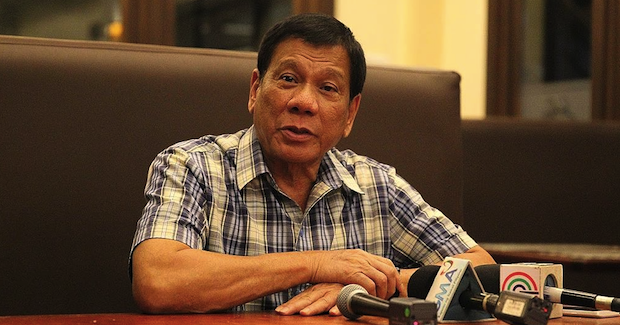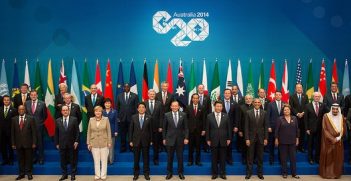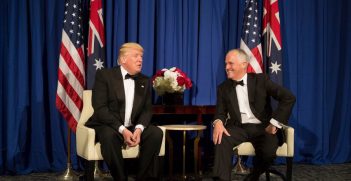Duterte's Pivot to China

The world paid attention to the highly anticipated visit of Philippine President Rodrigo Duterte to China for many reasons. It was seen as the ultimate gesture of revitalised relations between the two neighbours after years of animosity due to territorial disputes in the South China Sea. However, the trip became less about rekindling ties with China, and more about how the Philippines is breaking away from the United States.
Observers have interpreted Duterte’s first trip outside Southeast Asia as an attempt to seek new big power allies given his contempt for the United States and Europe. The official state visit occurred a few months after the historic arbitral ruling on the South China Sea that China refused to acknowledge and many have found it surprising that the already uncertain strategic regional environment can be further complicated by a small state like the Philippines.
By engaging China, Duterte seeks to tread a different path from previous governments toward a more independent foreign policy. The controversial leader believes that the close relationship with the US did not serve the national interest given its lack of credible commitment to defend the Philippines against foreign invasion. Though an independent foreign policy is a laudable goal, there is scepticism toward the move to attach the country to the region’s hegemon. Some fear that the president will abandon Scarborough Shoal in exchange for economic deals or reinstated fishing rights for Filipinos.
As top diplomat, Duterte can craft foreign policy in broad strokes. However, any major revisions to the status quo cannot be single-handedly altered even by a very popular president. Implementing sweeping changes is unsustainable given the country’s weak bureaucracy and elite-captured institutions. Philippine strategic interests are also not served by complete trust in China given its past actions. The key is to make a sober and wise distinction between Duterte’s off-the-cuff remarks and his government’s subsequent policy actions.
The Philippines-China Spring
Chinese President Xi Jinping described Duterte’s visit as springtime after a winter of mutual discontent. Their joint statement sought to continue stalled cooperative ventures and embark on new ones ranging from intelligence sharing to combat illegal drugs to public infrastructure, agriculture, and people-to-people exchange. The Philippine president left China with reportedly US$24 billion worth of deals, loans and aid.
As expected, Duterte’s fiery rhetoric trumped the economic outcome of the trip. He praised China’s generosity, identified with its ideological slant and promised to pursue a joint alliance with other countries. In that same vein, however, he announced his economic and military “separation” from the US.
After those remarks, the trip became less about rekindling ties with China more about how the Philippines is breaking away from its big brother, the US. The symbolism was too good not to be noticed: a US ex-colony and most trusted ally blessed with a geographic strategic advantage is now embracing the US’s fiercest rival.
Philippines-US relations: It’s complicated
The Philippine president eventually clarified he will not sever ties nor abrogate treaties with the US. Unlike other populist leaders, Duterte was also quick to recognise the limits of presidential power and the legal constraints of negotiating territorial claims.
The US reaction to Duterte’s remarks displayed a modicum of patience and sobriety. As a country whose political institutions were fashioned in their image, the US knows the Philippines better than any other country. It knows that this attempt to deviate cannot be maintained in the long run. The highly personalised nature of Philippine politics, an American colonial legacy, prevents this stance from being sustained. The US can also rest on the fact that it has inculcated shared values and interests among the Filipino elites and masses for decades that are now so robust that no leader, however popular, can dismantle or erode.
Duterte, however, is tapping into a sensitive sentiment shared by many Filipinos. While they are the most pro-American public in the world, it should not be taken as blind loyalty. Colonial atrocities remain imprinted into the Filipino collective consciousness. Duterte is the not the first Philippine president who is standing up against the US, nor will he be the last.
Though the US tolerates Duterte’s antics, it does not mean that it will just allow the Philippines to get away with it. Historically, the Philippines has paid a high price every time it veers away from the US as seen when the country refused to renew the military bases agreement and when it pulled out its contingent in the US-led coalition against Iraq in 2004. It will just depend how far-reaching these repercussions are to the country’s interests.
Credibility costs
In the meantime, there are already costs to Duterte’s pronouncements in the form of the diminished ability of the Philippines to make credible commitments abroad. Critics wasted no time highlighting his incompetence in foreign affairs while supporters say that he is drawing from a strategic playbook he alone is privy to. While pundits debate this, other states are taking note of Duterte’s words and actions. Foreign policy requires a level of consistency that reduces significant risks. While countries may benefit from the less conservative foreign policy stance of the maverick president, high payoffs are often canceled by higher risks.
So far, Duterte’s popularity at home means he does pay the audience costs related to his controversial statements. However, domestic politics can quickly change for the worse given that the political elites he displaced are wasting no time antagonising his government. More tempered Chinese officials acknowledge that things may completely change, resulting in foreign policy reversals; politics rarely stops at the water’s edge in the Philippines.
Duterte’s attempt to pursue an independent foreign policy is desirable and should be supported. Realising this vision does not mean substituting one major power for another but rather in adopting careful policies guided by the idea that ‘whether the elephants fight or make love, the grass will still suffer’.
Aries A. Arugay is associate professor of political science at the University of the Philippines in Diliman and executive director, of the Manila-based Institute for Strategic and Development Studies, Inc. He is also currently a visiting fellow of the Jeju Peace Institute in South Korea. @ariesarugay
This article is published under a Creative Commons Licence and may be republished with attribution.




